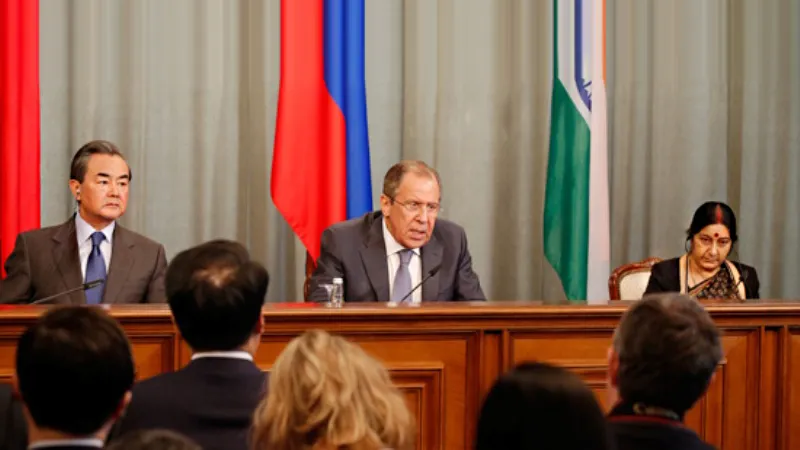-
CENTRES
Progammes & Centres
Location

The 14th Russia–India–China (RIC) foreign ministers meeting concluded in Moscow recently. The trilateral meeting highlighted the need for the three largest Asian economies to discuss the future of the Asian stability in the absence of existing security architecture. During the meeting an array of issues of regional and global interests were discussed between Foreign Ministers Sergey Lavrov, Wang Yi and Sushma Swaraj which included international terrorism, drug trafficking, Afghanistan, UN security reforms and economic issues. On completion of the meeting, a Joint Communiqué was issued which reflected the common positions held by all the three countries. One of the most interesting outcomes of the trilateral meeting has been the mention of maritime security disputes in the South China Sea (SCS). The joint statement indicated specifically:
Russia, India and China are committed to maintaining a legal order for the seas and oceans based on the principles of international law, as reflected notably in the UN Convention on the Law of Sea (UNCLOS). All related disputes should be addressed through negotiations and agreements between the parties concerned. In this regard the Ministers called for full respect of all provisions of the UNCLOS, as well as the Declaration on the Conduct of Parties in the South China Sea (DOC) and the Guidelines for the implementation of the DOC.
This reference to SCS in a RIC Joint Communique is important and has bearing on the present developments in Asia because of several reasons. First, this is the first time when SCS disputes have been mentioned in an RIC trilateral statement. It is significant that before the decision by the Permanent Court of Arbitration in The Hague, Beijing has chosen to issue a joint statement with Russia and India highlighting the importance of adhering to and respecting all the provisions of the UNCLOS. Analysts have mentioned that the joint statement resonates too closely with the statements issued by China’s foreign ministry statements on the SCS disputes and is reminiscent of Beijing’s traditional policy of opposing internationalisation of dispute resolution in the South China Sea. Whilst Beijing may not want to internationalise its bilateral disputes, it is a significant development that it has chosen to publicly mention in a joint statement of its willingness to uphold international laws. Second, India being a party to this joint statement has raised questions of India’s shifting course on the South China Sea disputes.
The joint statement does not reflect a shift in India’s position or its policies on the South China Sea. India is not moving from its traditional stance of upholding international norms and rights. If anything, this joint statement only further emboldens India’s position on the SCS. India on various platforms and forums have been mentioning about the importance of upholding the UNCLOS in matters of maritime disputes. For instance, during November 2015, at the 13th Association of Southeast Asia Nations (ASEAN)–India Summit held in Kuala Lumpur, Prime Minister Narendra Modi mentioned that all parties to the disputes in the South China Sea (SCS) should abide by the guidelines on the implementation of the Declaration on the Conduct of Parties in the SCS and redouble efforts for the early adoption of a Code of Conduct on the basis of consensus.
China’s assertive posturing in South China Sea over the last eight years has had consequences not only to its immediate neighbours but more importantly in the context of larger Asian stability. In fact, it is this posturing that has created anxieties and also made the role of other major powers in the region a reality. Even India that has traditionally sat on the fence has become much articulate about the South China Sea and the need to pay heed to other countries’ respective claims as well. China has to recognise that SCS is a contested territory and it should play by rule of law, as India did in the case of Bangladesh. India and the US have vested interests in seeing China abide by international law – a fact that the two have reiterated in the US–India Joint Strategic Vision for the Asia–Pacific and Indian Ocean issued in January 2015.
Thus, while the RIC statement does not see a shift in India’s approach, the fact that China acknowledges the role of UNCLOS in resolving the South China Sea dispute is a step in the right direction.
The views expressed above belong to the author(s). ORF research and analyses now available on Telegram! Click here to access our curated content — blogs, longforms and interviews.

Dr Rajeswari (Raji) Pillai Rajagopalan was the Director of the Centre for Security, Strategy and Technology (CSST) at the Observer Research Foundation, New Delhi. Dr ...
Read More +